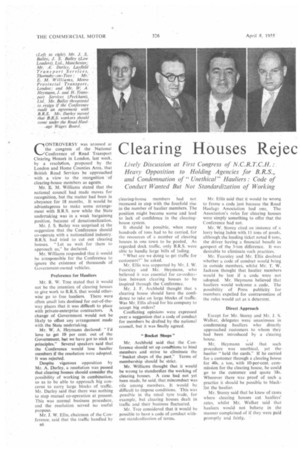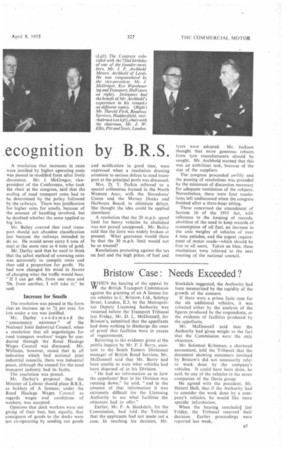Clearing Houses Rejec ecognition by B.R.S.
Page 40

Page 41

If you've noticed an error in this article please click here to report it so we can fix it.
Lively Discussion at First Congress of N.C.R.T.C.H. : Heavy Opposition to Holding Agencies for B.R.S., and Condemnation of" Unethical" Hauliers : Code of Conduct Wanted But Not Standardization of Working CONTROVERSY was aroused at the congress of the National Conference of Road Transport Clearing Houses in London, last week, by a resolution, proposed by the London and Home Counties Area, that British Road Services be approached with a view to the recognition of clearing-house members as agents.
Mr. E. M. Williams stated that the national council had made moves for recognition, but the matter had been in abeyance for 18 months. It would be advantageous to make some arrangement with B.R.S. now while the State undertaking was in a weak bargaining position, because of denationalization.
Mr. I. S. Bailey was surprised at the suggestion that the Conference should co-operate with a nationalized industry. B.R.S. had tried to cut out clearing houses. " Let us wait for them to approach us," he declared.
Mr. Williams responded that ii would be irresponsible for the Conference to ignore the existence of thousands of Government-owned vehicles.
Preference for Hauliers Mr. R. W. Tree stated that it would not be the intention of clearing houses to give work to B.R.S. that would otherwise go to free hauliers. There were often small lots destined for out-of-theway places that it was difficult to place with private-enterprise contractors. A change of Government would not be likely to offset any arrangement made with the State undertaking.
Mr. W. A. Heymann declared: " I'd love to get 10 per cent, out of the Government, bet we have got to stick to principles.Several speakers said that the Conference would lose haulier members if the resolution were adopted, It was rejected.
Despite vigorous opposition by Mr. A. Dailey, a resolution was passed that clearing houses should consider the possibility of working in combination, so as to be able to approach big concerns to carry large blocks of traffic. Mr. Darley said that there was nothing to stop mutual co-operation at present. This was normal business procedure, and the resolution served no useful purpose.
Mr. J. W. Ellis, chairman of the Conference, said that the traffic handled by n6 clearing-house members had not increased in step with the fourfold rise in the number of haulier members. The position might become worse and lead to lack of confidence in the clearinghouse system.
It should be possible, when many hundreds of tons had to be carried, for the resources of a number of clearing houses in one town to be pooled. As regarded dock traffic, only B.R.S. were able to handle large bills of lading.
"What are we doing to get traffic for customers?" he asked.
Mr. Ellis was supported by Mr. J. W. Fearnley and Mr. Heymann, who believed it was essential for co-ordination between clearing houses to be inspired through the Conference.
Mr. J. F. Archbold thought that a clearing house should have the confidence to take on large blocks of traffic. Was Mr. Ellis afraid for his company to accept big orders?
Conflicting opinions were expressed over a suggestion that a code of conduct for members he drafted by the national council. but it was finally agreed.
"Bucket Shops" Mr. Archbold said that the Conference should set up condftions to bind members and strive to eliminate the bucket shops of the past." Terms of membership should be strict.
Mr. Williams thought that it would be wrong to standardize the working of clearing houses. A cast had not yet been made, he said, that misconduct was rife among members. It would he difficult to impose conditions. This was possible in the retail tyre trade, for example, but clearing houses dealt in traffic and their business fluctuated.
Mr. Tree considered that it would be possible to have a code of conduct without standardization of terms.
Mr. Ellis said that it would be wrong to frame a code just because the Road Haulage Association had one, The Association's rules for clearing houses were simply something to offer that the Conference had not.
Mr. W. Storey cited an instance of a lorry being laden with 11 tons of goods, although the loading ticket noted 8 tons, the driver having a financial benefit in ',respect of the 3-ton difference. It was desirable to eliminate such practices.
Mr. Fearnley and Mr. Ellis doubted whether a code of conduct would bring in outside members, whilst Mr. T. W. Jackson thought that haulier members would be lost if a code were not adopted. Mr. Heymann believed that hauliers would welcome a code. The possibility of Press publicity for members expelled for contravention of the rules would act as a deterrent.
Direct Approach Except for Mr. Storey and Mr. .1. S. Walker, delegates were unanimous in condemning hauliers who directly approached customers to whom they had been introduced by a clearing house.
Mr. Heymann said that such procedure was unethical, yet the haulier "held the cards." If he carried for a customer through a clearing house for 40s. a ton, with 10-per-cent, commission for the clearing house, he could go to the customer and quote 38s. Wherever there was proof of such a practice it should be possible to blacklist the haulier.
Mr. Storey said that he knew of cases where clearing houses cut hauliers' rates, whilst Mr. Walker said that hauliers would not behave in the manner complained of if they were paid promptly and fairly. A resolution that increases in rates were justified by higher operating costs was passed in modified form after lively discussion. Mr. J. McGregor, vicepresident of the Conference, who took the chair at the congress, said that the scaling of road transport rates had to be determined by the policy followed by the railways. There was justification for higher rates for smalls, because of the amount of handling involved, but he doubted whether the same applied to big lots.
Mr. Bailey averred that road transport should not abandon classification just because the railways intended to do so. He would never carry 6 tons of coal at the same rate as 6 tons of gold.
Mr. Darley said that he used to think that the safest method of assessing rates was accurately to compile cOsts and then add a proportion for profit. He had now changed his mind in favour of charging what the traffic would bear. " If I can get 60s, from one man and 70s. from another, I will take it," he said.
Increase for Smalls
The resolution was passed in the form that an increase up to 7i per cent. for lots under a ton was justified.
Mr. Darley condemned the "unnecessary existence" of the National Joint Industrial Council, when a resolution that all negotiations for road transport workers' wages be conducted through the Road Haulage Wages Council wai discussed. Mr. Williams, however, stated that in all industries which had national joint industrial councils, there was industrial peace, although the council for the road transport industry had its faults.
The resolution was passed.
Mr. Darley's proposal that the Minister of Labour should place B.R.S., as holders of A licences, under the Road Haulage Wages Council as regards wages and conditions of workers, was accepted.
Opinions that dock workers were not giving of their best, but, equally, that consignors of goods to the docks were not co-operating by sending out goods and notification in good time, were expressed when a resolution drawing attention to serious delays to road transport at the principal ports was discussed.
Mrs. D. T. Parkin referred to a special corrimittee formed in the North Western Area, with the Stevedores' Union and the Mersey Docks and Harbours Board. to eliminate delays. She thought the idea could be applied elsewhere.
A resolution that the 20 m.p.h. speed limit for heavy vehicles be abolished was not passed unopposed. Mr. Bailey said that the Limit was widely broken at present. What guarantee would there be that the 30 m.p.h. limit would not be so treated?
Resolutions protesting against the tax on fuel and the high prices of fuel and
tyres were adopted. Mr. Jackson thought that more generous rebates from tyre manufacturers should be sought. Mr. Archbold warned that this was an ambitious task, because of the size of the suppliers.
The congress proceeded swiftly and the passing of resolutions was preceded by the minimum of discussion necessary for adequate ventilation of the subjects. Nevertheless, there were four resolutions left undiscussed when the congress finished after a three-hour sitting.
These concerned the amendment of Section 16 of the 1933 Act, with reference to the keeping of records. abolition of the need to keep records of consumption of oil fuel, an increase in the axle weights of vehicles of over 4 tons unladen, and the urgent requirement of motor roads—which should be free to all users. Taken en bloc, these resolutions were referred to the next meeting of the national council.




























































































